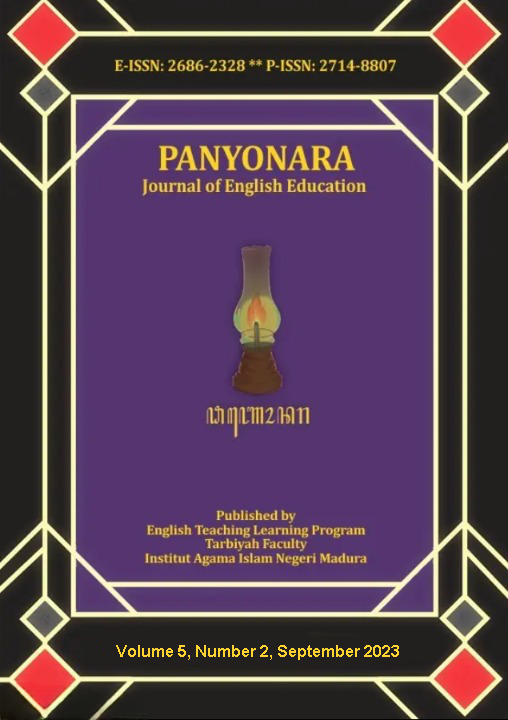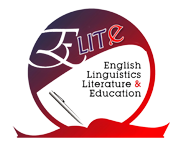Exploring Educotourism Through Eco-Literacy in English Learning Materials in MTs Sumber Bungur
 Abstract views: 168
,
Abstract views: 168
,
 PDF downloads: 221
PDF downloads: 221
Abstract
Some external factors affect the education system on the macro, including ideology, economy, politics, socio-culture, and natural environment. These factors affect each other in the educational system, including the interaction with the social and natural environment in the broader ecosystem. Eco-literacy should become the curriculum's main focus to face severe environmental problems in the future. The students' ecological intelligence can be grown through understanding the environment and how to be environmentally friendly. This study aims to investigate eco-literacy through English learning materials in terms of educotourism. This research applied the qualitative research method. The data showed in descriptive method because it needed to describe the eco-literacy in English learning materials in MTs Sumber Bungur Pakong regarding educotourism. Meanwhile, the data was collected from observations, interviews, and documentation in MTs Sumber Bungur Pakong. The research results showed the implementation of educotourism through eco-literacy in English earning materials in MTs Sumber Bungur Pakong by founding a syllabus design called ATP related to eco-literacy made by the school of MTs Sumber Bungur Pakong. The syllabus design existed two materials attached to eco-literacy are learned: obligations, prohibitions, and suggestions. Besides, the researcher also found the advantages and disadvantages in making the students aware of keeping the environment
Downloads
References
Arzani, Z. (2013, November 11). Teaching Chemistry by Using “Proverbs” [SSRN Scholarly Paper]. Rochester, NY. Retrieved from https://papers.ssrn.com/abstract=2352956
Budiyanto, M. A. K., Hadi, S., Aminah, T., & Husamah, H. (2020). Ecotourism-Based Learning Models in Efforts to Implement Effective Learning: A conceptual research. Prisma Sains : Jurnal Pengkajian Ilmu dan Pembelajaran Matematika dan IPA IKIP Mataram, 8(2), 69–80. https://doi.org/10.33394/j-ps.v8i2.3234
Butarbutar, R. R. (2012). Community Empowerment Efforts in Sustainable Ecotourism Management in North Sulawesi, Indonesia. 3(1), 1–7.
Capra, F. (1996). The Web of Life. New York: Doubleday.
Capra, F. (1999). Ecoliteracy: The Challenge for Education in the Next Century. California: Liverpool Schumacher Lectures.
Desfandi, M., Maryani, E., & Disman. (2017). Building Ecoliteracy Through Adiwiyata Program (Study at Adiwiyata School in Banda Aceh). Indonesian Journal of Geography, 49(1), 51–56. https://doi.org/10.22146/ijg.11230
Eisenberg, M. (2001). Discovery Learning, Cognitive Psychology of. In N. J. Smelser & P. B. Baltes (Eds.), International Encyclopedia of the Social & Behavioral Sciences (pp. 3736–3739). Oxford: Pergamon. https://doi.org/10.1016/B0-08-043076-7/01473-X
Feller, M. B. (2018). The Value of Undergraduate Teaching for Research Scientists. Neuron, 99(6), 1113–1115. https://doi.org/10.1016/j.neuron.2018.09.005
Holis, M. (2022, March 26). The Headmaster of MTs Sumber Bungur Pakong [Direct Interview].
Jack C. Richard. (2010). Curriculum Development in Language Teaching. Cambridge University Press.
Jones, P., Trier, C. J., & Richards, J. P. (2008). Embedding Education for Sustainable Development in Higher Education: A Case Study Examining Common Challenges and Opportunities for Undergraduate Programmes. International Journal of Educational Research, 47(6), 341–350. https://doi.org/10.1016/j.ijer.2008.11.001
Kahn, R. (2010). Critical Pedagogy, Ecoliteracy, & Planetary Crisis (Vol. 359). New York: Peter Lang.
Lin, Y.-R. (2023). An Idiom-Driven Learning Strategy to Improve Low Achievers’ Science Comprehension, Motivation, and Argumentation. Computers & Education, 195, 104710. https://doi.org/10.1016/j.compedu.2022.104710
Mainaki, R., Kastolani, W., & Setiawan, I. (2018). Ecological Intelligence Level of High School Students In Cimahi City. SHS Web of Conferences, 42, 00062. https://doi.org/10.1051/shsconf/20184200062
Marjorie Bingham Wesche. (2012). Content-based Second Language Instruction (2nd edition). The Oxford Handbook of Applied Linguistics.
Miles, M., & Huberman, M. (2014). Qualitative Data Analysis. USA: SAGE Publications.
Mishan, F., & Timmis, I. (2015). Materials Development for TESOL. Edinburgh: Edinburgh University Press.
Muthukrishnan, R. (2019). Using Picture Books to Enhance Ecoliteracy of First-Grade Students. The International Journal of Early Childhood Environmental Education, 6(2).
Noe, N. W. (2013). 10—Program and student assessment. In N. W. Noe (Ed.), Creating and Maintaining an Information Literacy Instruction Program in the Twenty-First Century (pp. 113–127). Chandos Publishing. https://doi.org/10.1016/B978-1-84334-705-7.50010-9
Player, L., Hanel, P. H. P., Whitmarsh, L., & Shah, P. (2023). The 19-Item Environmental Knowledge Test (Ekt-19): A Short, Psychometrically Robust Measure of Environmental Knowledge. Heliyon, 9(8), e17862. https://doi.org/10.1016/j.heliyon.2023.e17862
Putri, S. S. (2019). Increasing Ecoliteracy and Student Creativity in Waste Utilization. International Journal of Evaluation and Research in Education (IJERE), 8(2), 255. https://doi.org/10.11591/ijere.v8i2.18901
Rabbianty, E. N., Raihany, A., Syafik, M., Muqoddas, N., Irwansyah, H., Rahmawati, F., & Febrianingrum, L. (2022). Pemahaman Mahasiswa Terhadap Literasi Lingkungan (Ekoliterasi): Potensi dan Tantangan Menuju Kampus Ramah Lingkungan. Andragogi: Jurnal Diklat Teknis Pendidikan dan Keagamaan, 10(2), 163–176. https://doi.org/10.36052/andragogi.v10i2.302
Ramanujam Meganathan. (2008). Materials Development in English as a Second Language: An Indian Experience. ACADEMIA: Online Submission.
Ribosa, J., & Duran, D. (2022). Do Students Learn What They Teach When Generating Teaching Materials for Others? A Meta-Analysis Through the Lens of Learning by Teaching. Educational Research Review, 37, 100475. https://doi.org/10.1016/j.edurev.2022.100475
Salimi, M., Dardiri, A., & Sujarwo, S. (2021). The Profile of Students’ Eco-Literacy at Nature Primary School. Cypriot Journal of Educational Sciences, 16(4), 1450–1470. https://doi.org/10.18844/cjes.v16i4.5999
Siswanto, S., Karimullah, K., Prasetyawati, R., & Nurhayati, N. (2019). Environmental Cultured Education and Its Implication on the Student’s Competencies in an Adiwiyata School. Jurnal Cakrawala Pendidikan, 38(3), 552–564. https://doi.org/10.21831/cp.v38i3.23154
Smith, C. (2007). Education and Society: The Case for Ecoliteracy. Education and Society, 25(1), 25–37. https://doi.org/10.7459/es/25.1.03
Syah, N., Hidayat, H., Yuca, V., Ardi, Z., & Magistarina, E. (2021). Examining the Effects of Ecoliteracy on Knowledge, Attitudes, and Behavior Through Adiwiyata Environmental Education for Indonesian Students. Journal of Social Studies Education Research, 12(4), 209–230.
Tomlinson, B. (2008). English Language Learning Materials. London: Continuum International Publishing Group.
Tomlinson, B. (2011). Materials Development in Language Teaching (2nd ed.). United Kingdom: Cambridge University Press.
Willms, J. D. (2003). Student Engagement at School: A Sense of Belonging and Participation. Organization for Economic Cooperation and Development.
The journal uses an Open Access policy under a Creative Commons Attribution-NonCommercial 4.0 International License. Authors who publish with this journal agree to the following terms:
- Authors retain copyright and grant the journal right of first publication with the work simultaneously licensed under a Creative Commons Attribution License that allows others to share the work with an acknowledgment of the work's authorship and initial publication in this journal.
- Authors are able to enter into separate, additional contractual arrangements for the non-exclusive distribution of the journal's published version of the work (e.g., post it to an institutional repository or publish it in a book), with an acknowledgment of its initial publication in this journal.
- Authors are permitted and encouraged to post their work online (e.g., in institutional repositories or on their website) prior to and during the submission process, as it can lead to productive exchanges, as well as earlier and greater citation of published work.
















